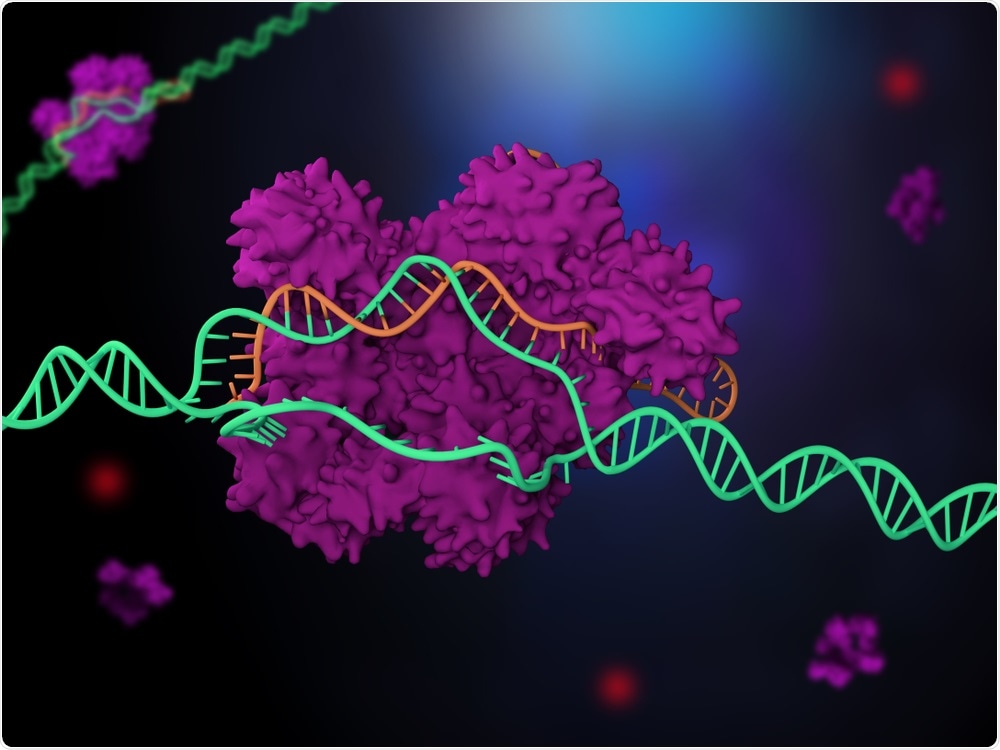Two non-toxic molecules that could allow scientists to have better control over CRISPR gene editing have been identified. Researchers say that the molecules could halt the gene editing process within minutes, decreasing the risk of genetic mutations.
 Meletios Verras | Shutterstock
Meletios Verras | Shutterstock
CRISPR-Cas9 stands for clustered regularly interspaced short palindromic repeats and CRISPR-associated protein 9. CRISPR-Cas9, which is a naturally occurring gene editing complex present in bacteria, is now one of many approaches to gene editing in the laboratory.
Bacteria collect pieces of DNA from viruses and use them to produce segments of DNA called CRISPR arrays, which enables the bacteria to remember the viruses so they can create RNA segments from the CRISPR arrays to target the DNA in the virus. The virus is disabled by the bacteria, making use of Cas9 to cut the DNA into pieces.
In laboratories, CRISPR-Cas9 is directed to a location by a guide RNA that binds to specific target sequence of DNA in a gene. The RNA also binds to the Cas9 enzyme, and once the DNA has been cut, researchers can use the cell’s DNA repair processes to make changes to the DNA with customized DNA sequences.
This kind of gene editing is important in research into preventing and treating disease, however it has not been determined if it is completely safe for use in people, with many animal models being used in experiments.
Mutations can occur after CRISPR gene editing, which is an understandable cause for concern when considering the health risks associated with the process.
Amit Choudhary of Harvard University has been working to discover compounds that can help increase the control researchers have over CRISPR.
The first synthetic inhibitors of CRISPR-Cas9
After analyzing thousands of molecules, Choudhary and his colleagues have identified two molecules that could possess the ability to stop the CRISPR-Cas9 enzyme from working in just a few minutes.
“Precision control lies at the heart of powerful technologies,” said Choudhary.
In the paper published in the journal Cell, the researchers report they have developed a “generalizable platform that provided the first synthetic small-molecule inhibitors of Streptococcus pyogenes Cas9 (SpCas9)”. They have also developed a range of assays for SpCas9 to identify compounds that “disrupt the SpCas9-DNA interaction.”
The most commonly used CRISPR-Cas9 system uses a Cas9 enzyme that is always switched on, which increases the risk of it binding to other DNA sequences and causing unwanted mutations.
The paper explains that precision control has created a demand for inhibitory anti-CRISPR molecules and that SpCas9 is being developed as a gene therapy agent for a number of diseases, from HIV and muscular dystrophy to vision disorders and other hereditary condition.
The two molecules that researchers have discovered inhibit the Cas9’s ability to recognize and bind to DNA, which would allow scientists to halt gene editing in minutes. This would reduce the risk of unwanted mutations and potential health risks.
Non-toxic and highly effective
Small inhibitors are thought to act quicker than the larger ones that have already been created. Additionally, smaller inhibitors may not induce any immune responses in the host.
When tested in mammalian cell and human plasma, the researchers found the newly-identified molecules were not toxic and did not disrupt any activity in essential genes.
On the topic of further research, the study states:
Our future studies will involve the identification of nuclease inhibitors and an exploration of possible synergies between the two classes of inhibitors.
Although our inhibitors are nontoxic to mammalian cells and do not alter transcription and translation of housekeeping genes, it remains to be determined whether these inhibitors or the anti-CRISPR proteins interact with other targets in mammalian cells.”
It also says that future efforts will focus on the “identification of inhibitors for next-generation CRISPR systems and understanding their mode of inhibition as well as the application of such inhibitors.
Journal reference:
Maji, B. (2019). A High-Throughput Platform to Identify Small-Molecule Inhibitors of CRISPR-Cas9. Cell. doi.org/10.1016/j.cell.2019.04.009.